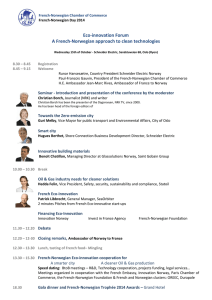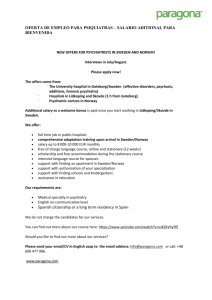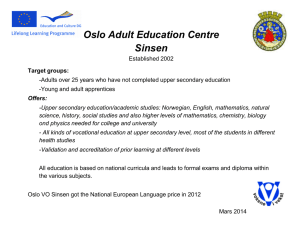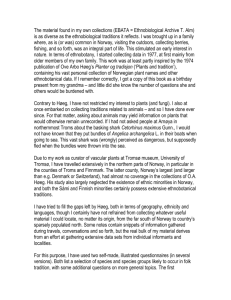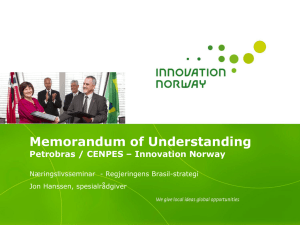Peace Prize Forum seminar, 2012 excursion
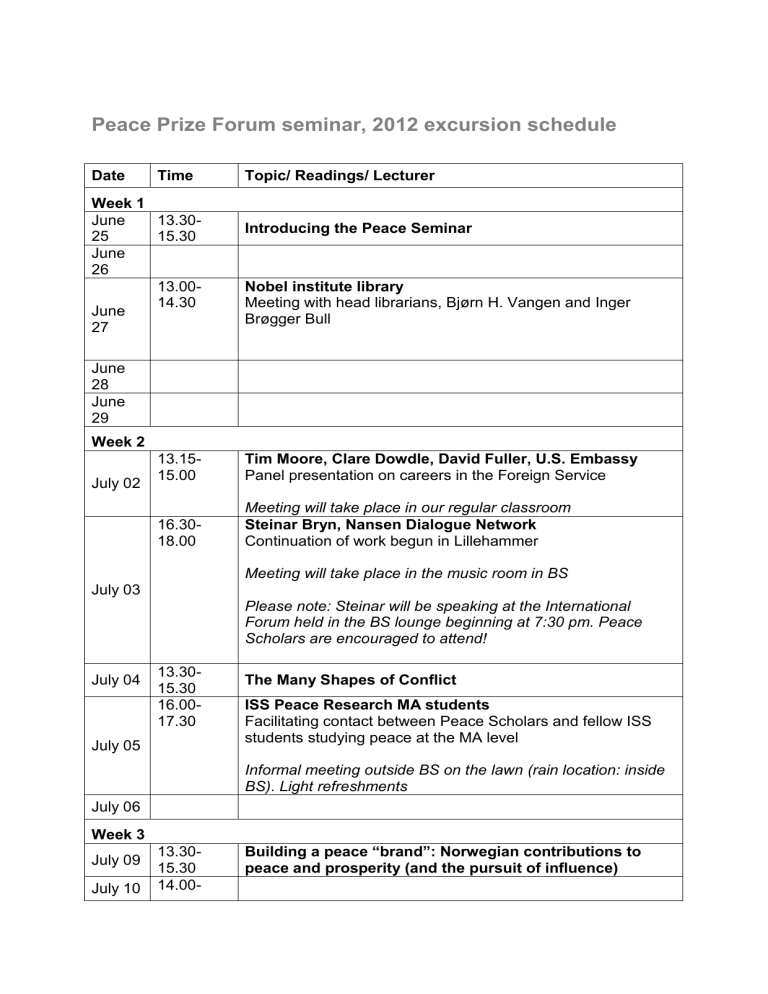
Peace Prize Forum seminar, 2012 excursion schedule
Date Time
Week 1
June
25
June
26
13.30-
15.30
13.00-
14.30
June
27
Topic/ Readings/ Lecturer
Introducing the Peace Seminar
Nobel institute library
Meeting with head librarians, Bj ørn H. Vangen and Inger
Brøgger Bull
June
28
June
29
Week 2
July 02
13.15-
15.00
July 03
16.30-
18.00
July 04
13.30-
15.30
16.00-
17.30
July 05
Tim Moore, Clare Dowdle, David Fuller, U.S. Embassy
Panel presentation on careers in the Foreign Service
Meeting will take place in our regular classroom
Steinar Bryn, Nansen Dialogue Network
Continuation of work begun in Lillehammer
Meeting will take place in the music room in BS
Please note: Steinar will be speaking at the International
Forum held in the BS lounge beginning at 7:30 pm. Peace
Scholars are encouraged to attend!
The Many Shapes of Conflict
ISS Peace Research MA students
Facilitating contact between Peace Scholars and fellow ISS students studying peace at the MA level
Informal meeting outside BS on the lawn (rain location: inside
BS) . Light refreshments
July 06
Week 3
July 09
13.30-
15.30
July 10 14.00-
Building a peace “brand”: Norwegian contributions to peace and prosperity (and the pursuit of influence)
July 11
16.00
14.00-
16.00
July
12
July
13
Week 4
July 16
July 17
July 18
13.30-
15.30
14.00-
16.00
July 19
July 20
13.30-
15.00
15.00-
16.30
Week 5
July 23
July 24
13.30-
15.30
13.30-
15.30
July 25
July 26
13.30-
15.30
July 27
Week 6
July 30
13.30-
15.30
Henrik Syse, Senior Researcher, PRIO (Peace Research
Institute in Oslo)
Introduction to PRIO's areas of research and discussion of
Syse's work on just war theory
Meeting held at PRIO's main offices
No Classes: Long Weekend
No Classes: Long Weekend
We liked you better over there: the reception of refugees and the politics of asylum
Rena Levin, Fulbright Norway
Information session, applying for a Fulbright grant
Meeting held at offices of Fulbright Norway
Tim Moore, U.S. Embassy
Tour of embassy
Human Rights: for export only?
Lisa Cooper, Leadership Foundation & Norwegian-Somali bridge-building project
Introduction to LF and NORSOMbro's efforts to re-frame diversity in 21st century as a national resource
Meeting held in our regular classroom.
Kjell Magne Bondevik, Founder and President, Oslo
Center for Peace and Human Rights (former Prime
Minister of Norway)
Meeting held at offices of Oslo Center
Steinar Bryn final session - closure - brainstorming ways to sustain work done this summer on return to U.S.
July 31
August
01
August
02
August
03
Mobilizing for non-violence, pursuing peace
Peace Prize Forum Seminar, 2012 course syllabus
Course code: ISSNPPF 1810
Credits: 5 ECTS credits
Time: Mondays, 1:30-3:30pm, plus regular excursions
Classroom: Georg Morgenstiernes hus, 141
Course leader:
Jeff Lugowe e-mail: j.a.lugowe@iss.uio.no
mobile phone: (+47) 96 01 85 90
Course Objectives
This course provides a general introduction to the interdisciplinary field of peace and conflict studies and the study of human rights. The content varies from year to year according to background and expertise of the course leader, and combines theoretical and empirical approaches. The course treats on topics related to the causes of conflict, peacebuilding, nonviolence, and human rights. Case studies are drawn from diverse corners of the world, as well as from Norway, whose role as a force for good and broker of peace is critically assessed against the backdrop of recent academic and public debates over the underlying aims of Norwegian foreign policy, and the treatment of indigenous minorities, newcomers to Norway and their descendants.
Course Structure
The course is six weeks in duration and comprises six seminars and an extensive program of excursions.
Requirements and Grading
This course requires active, participatory learning in order to succeed. Grades are based on the following components:
1.
2.
Written take-home exam (75%): The exam takes the form of a ten-page, doublespaced paper in which students draw on assigned readings as they formulate responses to questions related to themes taken up in the course. Due date:
Thursday, August 2, 2011, at 5:00 pm, submitted by e-mail to the
instructor with your signed affidavit.
Project proposal and presentation (25%): Students will submit a draft project proposal by Friday, June 29th at 5 pm. In it, they will present their chosen topic and briefly outline their plans for conducting research. They will also raise any questions or concerns they have connected with their research. On the basis of instructor feedback, summer research and PPF seminar readings and excursions, students will submit an end-of-semester progress report on
Monday, July 23rd at 1:30 pm in which they summarize their work thus far, the challenges they have faced, challenges they have faced and their research plan going forward. They will also include a list of six written sources on which they have relied or will rely. Finally, they will present their projects-in-progress during a PPF seminar session.
Grading Scale
A – Excellent performance D – Fair (below average)
B – Very Good E – Sufficient (meets minimum criteria)
C – Good (average performance) F – Fail (does not meet minimum criteria)
Expectations
Students are expected to fully participate in the course sessions through dialogue and interaction in class. Students are expected to show up to class on time and on a consistent basis, be well prepared by having read the readings before each seminar, and to actively ask questions, take notes and contribute to discussion during class.
Participation is a fundamental element of this course. Please note that attendance at all PPF seminars and excursions are mandatory and must take
precedence over other course and personal commitments. If you are unable to attend a seminar or excursion session due to illness or an emergency, you are expected to notify the appropriate course coordinator before your absence. If you do not do so, your grade will be lowered as a result.
All students are expected to respect the other students in the class as well as the course coordinators and external lecturers and facilitators. Students, lecturers, and the course coordinators are coming from a variety of countries and personal and academic
backgrounds. Please respect the beliefs, views, attitudes, practices and values of your comrades, and take the opportunity to learn from them.
Cheating is absolutely NOT tolerated. This includes plagiarism on papers and exams.
Plagiarism is defined as using other people’s work without proper citation and references and making it seem that the content of the academic work is one’s own.
Plagiarism may also include a clear lack of references and citations in a term paper, or a section of writing that is identical with other work and which has not been placed in quotation marks. Plagiarism on term papers and exams is sanctioned the same way as attempts of cheating. Any student found cheating on any of the exams (group paper, written exam) will automatically fail the course. No exceptions will be granted to this rule.
Wednesday,
July 4th
The many shapes of conflict: an
overview
Thomas Hylland Eriksen: "A darker shade of pale: cultural intimacy in an age of terrorism" (2 pages) (E)
----------------------------------------
Eric Hobsbawn. 2002. “War and Peace in the 20th
Century.” (15 pages) (C)
Walzer, Michael. 2000. “Chapter 6: Interventions” in Just and Unjust Wars: A Moral Argument with Historical
Illustrations. (23 pages) (C)
Galtung, Johann. 1990. "Cultural Violence." (15 pages) (E)
Fearon, James D. and David D. Laitin. 2003. "Ethnicity,
Insurgency and Civil War." (16 pages) (E)
Soysa, Indra de. 2005. "Filthy Rich, Not Dirt Poor! How
Nature Nurtures Civil Violence." (21 pages) (C)
Bringa, Tone. 2002. "Averted gaze: genocide in Bosnia-
Hercegovina" in Anthropology of Genocide. (32 pages) (C)
Fawcett, Louise. 2002. “Rivalry over Territory and Resources and the Balance of Peace and War: The
20th Century.” (22 pages) (C)
Ramsbotham, O., T. Woodhouse,
T., and H. Miall. 2005.
“Introduction to Conflict
Resolution: Concepts and
Definitions” in Contemporary
Conflict Resolution. (C)
Week 3
Monday,
July 9th
Building a peace “brand”: Norwegian contributions to peace and prosperity
(and the pursuit of influence)
Ingebritsen, Christine. “Norm Entrepreneurs.” (13 pages)
(E)
Tvedt, Terje. 2007. “International Development Aid and
Its Impact on a Donor Country: A Case Study of Norway.”
(22 pages) (H)
Harpviken, Kristian Berg and Kjell
Erling Kjellman. 2004). ”Beyond
Clueprints: Civil Society and
Peacebuilding”. (17 pages) (E)
Gullestad, Marianne. 2007. “Establishing a Goodness
Regime” in Picturing Pity: Pitfalls and Pleasures in Cross
Cultural Communication – Image and Word in a
North Cameroon Mission, 2007. (39 pages) (H)
Ana Devic. 2006. "Transnationalization of Civil Society in
Kosovo: International and Local Limits of Peace and
Multiculturalism." (17 pages) (E)
Week 4
Monday,
July 16th
We liked you better over there: the reception of refugees and the politics
of asylum
Convention and Protocol relating to the Status of Refugees.
1951 (1967) (excerpts) (E)
Crisp, Jeff. 2003. “Refugees and the Global Politics of
Asylum.” 75-87. (13 pages) (E)
Moorehead, Caroline. 2005. “The Homeless and the
Rightless.” in Human Cargo: A Journey Among Refugees.
(18 pages) (C)
Boswell, Christina. 2006. “The Liberal Dilemma in the
Ethics of Refugee Policy” (19 pages) (C)
Brekke, Jan-Paul and Monica Five Aarset. 2009. "Why
Norway?: understanding asylum destinations" (excerpts).
(24 pages) (E)
Hagelund, Anniken. 2005. “Why it is bad to be kind.
Educating refugees to life in the welfare state. A case study from Norway.” (15 pages) (E)
Week 5
Monday,
July 23rd
Human rights: for export only?
Brochmann, Grete and Knut Kjeldstadli. 2010.
“Introduction” in A History of Immigration: The Case of
Norway, 900-2000. (17 pages) (H)
Minde, Henry. 2003. “Assimilation of the Sami – implementation and consequences.” (26 pages) (E)
Gullestad, Marianne. 2002. “Invisible Fences:
Egalitarianism, Nationalism and Racism.” (19 pages) (E)
Hagelund, Anniken. “Dealing with the Dilemmas:
Integration at the Street-level in Norway.” (24 pages) (E)
Krohn, Bente Ramona. “Gay parade in Muslim territory.”
(approx. 4 pages) (E)
Week 6
Monday,
July 30th
Mobilizing for non-violence, pursuing
peace
Beyer, G. J. 2007. "A Theoretical
Kant, Immanuel. 1795. "Perpetual Peace: A Philosophical
Sketch." (approx. 6 pages) (E)
Lawrence, William. “Saami and Norwegians protest construction of Alta Dam, Norway, 1979-1981.” (approx. 3 pages) (E)
Schock, Kurt. 2003. "Nonviolent Action and its
Misconceptions: Insights for Social Scientists," Political
Science and Politics, 36. 705-712. (8 pages) (E)
Gurr, Ted Robert. 2000. "Nonviolence in Ethnopolitics:
Strategies for the Attainment of Group Rights and
Autonomy." (6 pages) (E)
Seidman, Gay W.. 2000. "Blurred Lines: Nonviolence in
South Africa." (7 pages) (E)
-----------------------------
Dunn, David J. 1985. "The Peace Studies Debate," The
Political Quarterly 56(1). 68-72. (4 pages) (E)
Bawer, Bruce. 2007. "The Peace Racket," City Journal,
Summer 2007. 1-7. (approx. 7 pages) (E)
Appreciation of the Ethic of
Solidarity in Poland Twenty-Five
Years After.” (26 pages) (E)
Shock, Kurt. 1999. “People Power and Political Opportunities: Social
Movement Mobilization and
Outcomes in the Philippines and
Burma.” (20 pages) (E)
